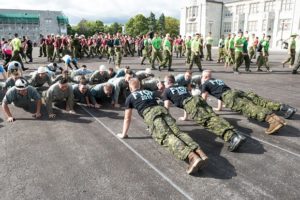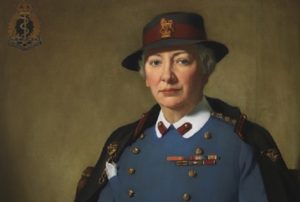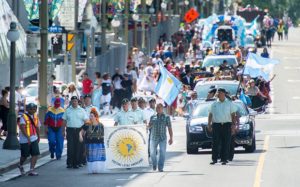The CAF honours its first female Army colonel. Two Army officers are seeking formal recognition of the growing number of CAF members with Latino heritage. And the century-old Royal Military College goes under a thorough investigation
These are the stories we’ll be reviewing on the Vanguard Radio.
+++
Early last week, cadets and personnel of the Royal Military College in Kingston, Ontario gathered to hear a somber announcement from Vice- Admiral Mark Norman.
The 140-year-old institution that has groomed the men and women who would become officers of the Canadian Armed Forces was being placed under a review.

By now the Special Staff Assistant Visit team has already begun their initial investigation which Adm. Norman said will cover the “climate, training, environment, culture and program construct at the RMCC.
Deployment of the SSAV comes at a time when the there are several concerns over suspected suicide and allegations of sexual misconduct in campus.
In recent months, there have been several reports of sexual misconduct at the college.
Court martial documents show that an officer cadet received a severe reprimand and a fine of $2,000 in May 2015 after pleading guilty to a charge of assaulting a fellow cadet without her consent in 2013.
The military is also investigating the sudden deaths between May and August of three RMCC cadets aged 19 to 22.
However, Adm. Norman wants to make it clear that the ongoing review is not entirely about sexual misconduct.
“Yes that has been one of the contributors,” he said. “But the SSAV is not exclusively focused on that one dimension.”
This is an investigation into a “broader malaise,” he stressed.
In his letter to the parents, the vice chief of staff said the SSAV team will examine the following areas:
* What are the significant stressors affecting RMCC cadets? Can cadets identify and seek help to deal with stress without being viewed as weak?
* What support mechanisms are available to cadets for their mental health support, physical fitness, and counselling? How are cadets being made aware of these?
* What is the state of moral of RMCC cadets, the military wing and the academic wing? What are the factors leading to this state of morale?
* Does the current command structure of the college allow it to carry out its mission?
The admiral said the findings of the team will help inform decision on what changes or remedies should be done.
The military hope to conclude the review by February next year.
+++++
Elizabeth Lawrie (Beth) Smellie was the daughter of a frontier physician who was a chief surgeon for the Canadian Pacific Railway as it was being built.

Despite her father’s discouragement, she left home to study nursing at Johns Hopkins Hospital School of Nursing in Baltimore, Maryland.
At the age of 25 in 1909, diploma in hand, she returned to Canada to as the night supervisor at McKellar General Hospital in her hometown, followed by a stint as a private nurse.
When the First World War broke out in 1914, Beth was one of the first to be accepted into the Royal Canadian Army Medical Corps as a nursing sister.
No one probably knew it then, but Beth would become the first woman to reach in the rank of Colonel in the Canadian Army in 1944.
Few probably remember her accomplishments now, but she made several ground breaking strides in the field of medicine both in the service and in civilian life.
Beth is also known for organizing the Army’s Canadian Women’s Army Corp. in 1941.
You can find out more about bet in Lynn Capuano’s story: First female Army colonel oversaw creation of CWAC.
++++++
Two Canadian Army officers have taken it upon themselves to shine a light on the contributions of Latin-Canadian members in particular.
Captain Rey Garcia-Salas and Captain Milton Hoyos hope to see, beginning as early as next year, Latin-Canadians acknowledged with an event similar to Black History Month each February and Asian Heritage Month in May.

Both men were part of a CAF delegation to this year’s Festival Latino in Ottawa. They and about a dozen other CAF representatives took part in the event, reports Steven Fouchard in his recent Vanguard post.
A native of Guatemala, who joined the Army Reserve in the late 1990s, Capt. Garcia-Salas is hoping a formal event within CAF will also serve as a demonstration to young Latin-Canadians that the organization is both welcoming and an excellent place to build a rewarding career.
Read more about his story, in Steven’s post: Army officers propose formal Latino heritage recognition
++++
Well, that’s it for now.
I hope you enjoyed our review of some of the stories we covered last week.
This is you host Nestor Arellano, saying see you again next week on, the Vanguard Radio.
